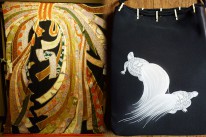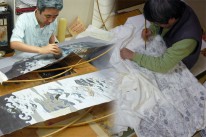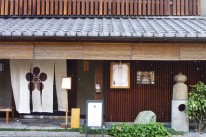Takahashitoku
Coporate Profille
Takahashitoku Co., Ltd was established in 1889 in the traditional business of hand-drawn yuzen (silk). After 100 years business relations with Chiso, a 450-year silk dyeing company in Nakagyo ward in Kyoto, marked the beginning of Takahashtoku yuzen. Firstly, it started a silk-dyeing workshop. Secondly, three years ago, it opened shops that sell yuzen products such as card cases. Furthermore, it started managing and organizing galleries and events in February 2011, where traditional craftwork was exhibited. Overall, it wishes to contribute as a source of information to other art craftsmanship in Japan.
Story
Yuzen- dyeing originated from mid-Edo period in Kyoto by Yuzen Miyazaki, a fan-painting craftsman. His designed products became a huge market success and helped building the brand reputation. During that period, Tsunayoshi Tokugawa, the 5th general of the Edo Bakufu (Japan’s feudal government), implemented the Shashi Prohibition Law (Prohibition of Luxury Goods) to prohibit the use of embroidery and golden threads. Under such circumstances, Yuzen Miyazaki still produced original designs that were permitted by the law. Thanks to the collaboration between the kimono and fan-painting craftsmen, attractive designs of silk painting were produced. After the Meiji era, pattern templates of yuzen started to appear as well.
Interview
Our yuzen designs are available in various styles and genres; currently major products are popular yuzen lines in market sales. In the past, we needed to hand on the craftsmanship to the next generation, so we needed to keep making products regardless of the market requirements. This is an important investment and approach for people to understand the roots and origins of yuzen. We highly value what we are doing today to pay respect to our ancestors’ efforts to bring this tradition today. Our mission is to preserve this traditional craftsmanship despite the fluctuation in the markets.
Recommendation
There is a large line-up of products available, ranging from fancy yuzen goods such as scented bags, obi, card cases, tabi (cloth-made shoes), spectacle cases, Sukiya tabi (shoes made of cloth for tea ceremonies) and so on. The price of an obi is around 2200 yen; 4600 yen for a card case, and 15,000 yen for a Sukiya tabi (small size). All these items are made in the sophisticated traditional process as required for kimono, yet accessible for regular customers.
Apart from that, the “Yuzen Hands-on Experience Kit” allow customers to try yuzen making at home. One can bring one’s own design into practice. This approach gives customers the freedom to design their own bags.
Based on contents and photographs available in the National Museum of Japanese History, Takahashitoku made replicas of the mid-Edo era styled kimono using hand-drawn yuzen materials. These are not for sale, but are preserved as a symbol and yardstick of standards set by the original techniques.




